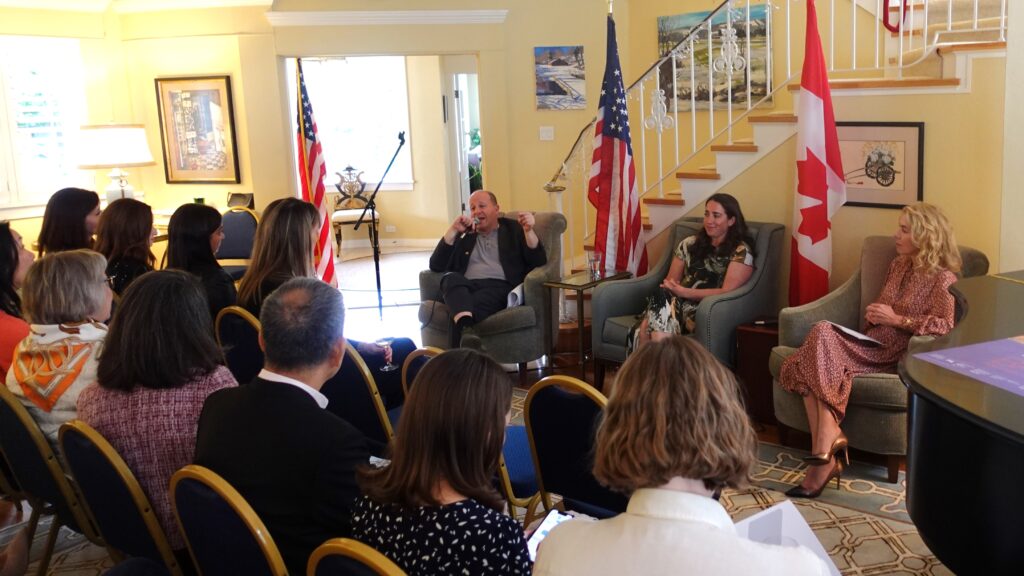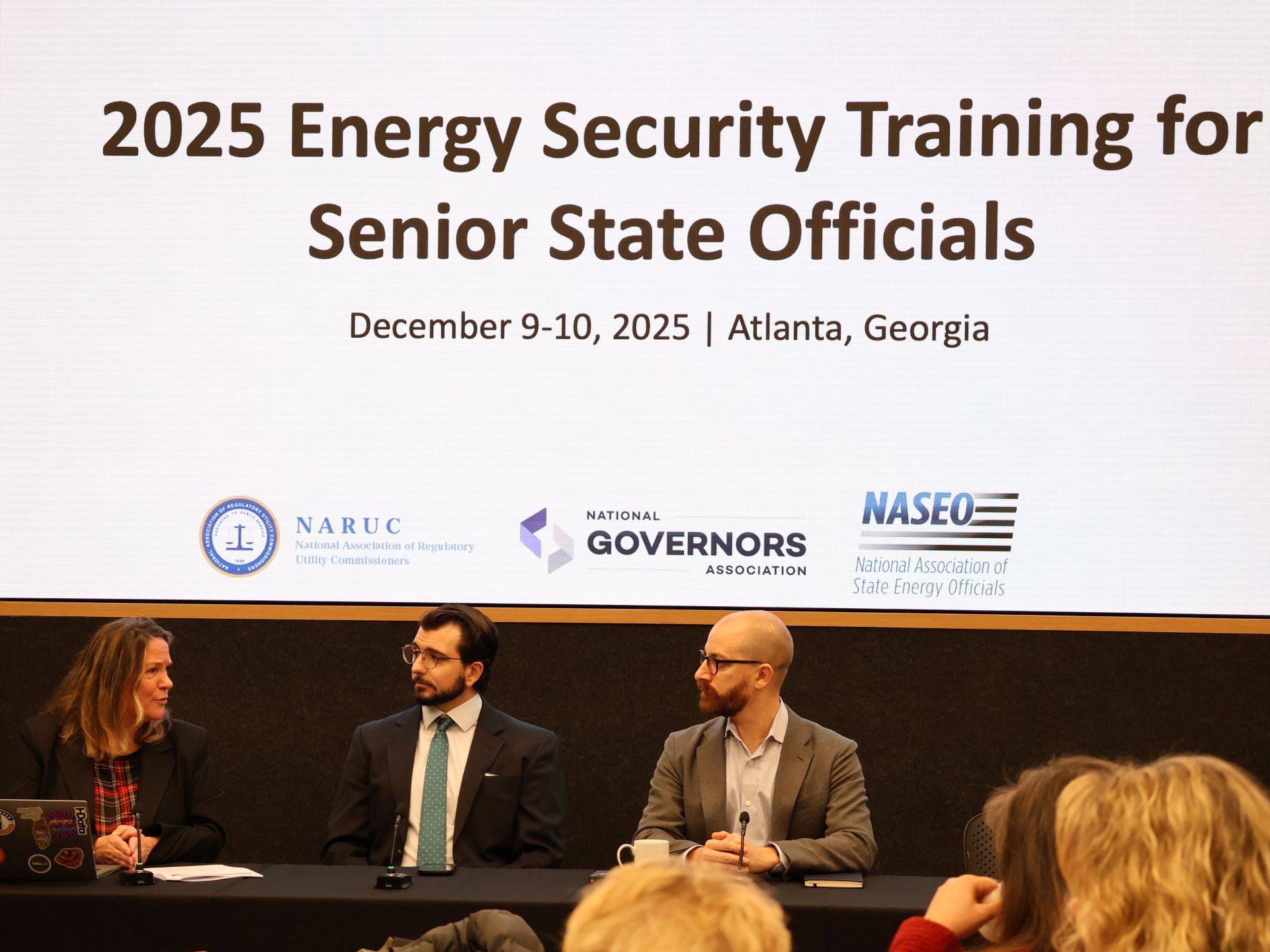At NGA, we take best practices seriously, with dedicated teams who work with state policy leaders and other experts to foster information sharing between states and develop innovative solutions to public policy challenges. One of those challenges, and one that is top of mind for Governors, is ensuring all students graduate with the skills and knowledge necessary for success. Supporting Governors in this work has been the mission of NGA Chair Colorado Governor Jared Polis’ Let’s Get Ready! Educating All Americans for Success initiative, which has held events around the country. Not content to only learn about great work in U.S. states and territories, Governor Polis held a convening in Canada last week to pull international best practices into the discussion.
Zoe Weintraub from Guild and Wendy Campbell from Junior Achievement British Columbia joined Governor Polis for a fireside chat on preparing students of all ages for workforce success. U.S. Consul General James DeHart welcomed attendees to Vancouver before turning the microphone over to Governor Polis, who introduced the speakers.

Zoe Weintraub opened the discussion by emphasizing Guild’s mission to partner with major employers to create education-to-career pathways that remove financial and structural barriers for working adults. A key part of their approach is identifying in-demand roles and teaming with learning institutions to offer stackable credentials, which are particularly beneficial for adult learners who often don’t know how to talk about skills they have developed. Weintraub highlighted innovative examples, such as how Chipotle and Walmart have translated internal training into college credit. She also stressed the need for better systems to track upward mobility, suggesting that states could play a role in creating more universal methods for capturing employment and income data on individuals who have completed training and credentialing programs.
A major theme of Weintraub’s was the challenge of scalability and system-wide impact. Employers, according to Weintraub, are more likely to engage if they see education solutions that can be implemented across their workforce and not just in one place. She called attention to issues like the lack of interoperability in licensure across states, which hinders mobility in healthcare and other regulated professions. Employers have responded by creating what she calls “lower-case apprenticeship programs” to avoid the administrative burdens of formal registered apprenticeship programs. Weintraub also pointed to the ongoing need for soft skills development, noting that employers consistently request training in areas like communication, leadership, and collaboration. She said that Guild started with a soft skills focus and continues to strengthen its soft skills training. Weintraub encouraged more investment in K–12 and postsecondary systems to better prepare students with these interpersonal skills.
“About five years ago, we established 18 in-demand career pathways, anything from nursing or applied or allied health to cybersecurity. And then we said: ‘Great. What innovative work are providers doing in that space, and how do we raise the bar for all of those providers? And what’s the way that we measure that bar?’ And the biggest way that we measure it is, are people moving? Are they making more money? What is the economic advancement of those individuals?”
Zoe Weintraub
Wendy Campbell gave some background on Junior Achievement, which works with approximately 20 million students across over 100 countries to teach financial literacy, entrepreneurship and employment skills. This fills a key gap in education by teaching life skills often missing from traditional curricula, especially as young people face economic insecurity, misinformation from social media and an evolving job market. Their programs rely on industry volunteers who bring real-world insights into classrooms, enhancing student engagement and understanding.
Campbell talked about the importance of experiential learning and soft skills development through programs like the Company Program, which runs over 16 weeks and allows students to build and run real businesses. This hands-on approach teaches both hard skills (like budgeting and pricing) and essential soft skills (like leadership, teamwork, and decision-making). She also underscored the value of collaboration between the public education system and nonprofit organizations. Rather than relying solely on schools to deliver complex and evolving career skills, groups can leverage the expertise of business leaders to bring financial education to life in ways that are relatable and actionable for students. This partnership model not only exposes students to critical real-world skills but also allows teachers to focus on their core curriculum.
“We’re helping young people build a smart relationship with money. We’re giving them entrepreneurial opportunities and employment-ready skills.”
Wendy Campbell
A wide-open question and answer discussion closed out the event, with participants noting the importance of employer engagement. Employers have the most visibility into job requirements and the skills that prospective employees have and don’t have, but this information needs to be shared and integrated into education and workforce policy. This can be encouraged through funding to motivate upskilling and reskilling, as well as integrating credentialing into employers’ branding. These programs can help develop desperately needed feedback loops between the job market and training programs. And while lifetime learning should be a goal to allow for individuals to respond to a dynamic market for skills, early pathways to career awareness and credential development in the K-12 systems are vital. In his closing thoughts, Governor Polis encouraged Governors to take a close look at teacher preparation and ensuring teachers are not just credentialed to do the job but are effective in doing it.
“Let’s really look at teacher preparation and how we can make sure that our teachers are effective, which is, by the way, a prerequisite for all of this to work. For them to be successful in getting skills to students, they have to be effective at what they do.”
Governor Jared Polis












